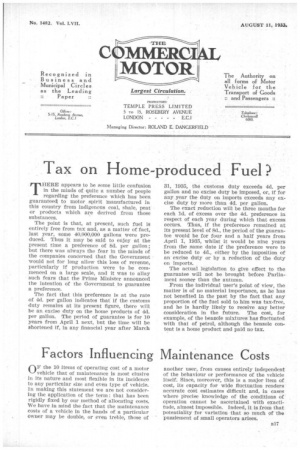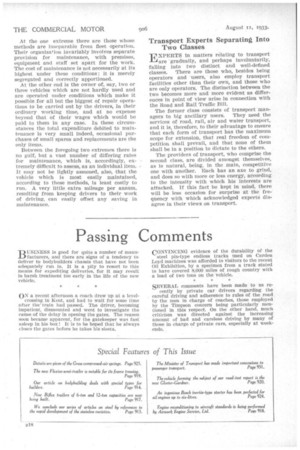Factors Influencing Maintenance Costs
Page 27

Page 28

If you've noticed an error in this article please click here to report it so we can fix it.
OFthe 10 items of operating cost of a motor vehicle that of maintenance is most elusive in its nature and most flexible in its incidence to any particular size and even type of vehicle. In making this statement we are not considering the application of the term : that has been rigidly fixed by our method of allocating costs. We have hi mind the fact that the maintenance costs of a vehicle in the hands of a particular owner may be double, or even treble, those of another user, from causes entirely independent of the behaviour or performance of the vehicle itself. Since, moreover, this is a major item of cost, its capacity for wide fluctuation renders accurate cost estimates difficult and, in cases where precise knowledge of the conditions of operation cannot be ascertained with exactitude, almost impossible. Indeed, it is from that potentiality for variation that so much of the puzzlement of small operators arises. At the one extreme there are those whose methods are inseparable from fleet operation. Their organization invariably involves separate provision for maintenance, with premises, equipment and staff set apart for the work. The cost of maintenance is not necessarily at its highest under these conditions : it is merely segregated and correctly apportioned.
At the other end is the owner of, say, two or three vehicles which are not hardly used and are operated under conditions which make it possible for all but the biggest of repair operations to be carried out by the drivers, in their ordinary working time, and at no expense beyond that of their wages which would be paid to them in any case. In these circumstances the total expenditure debited to maintenance is very small indeed, occasional purchases of small spares and replacements are the only items.
Between the foregoing two extremes there is no gulf, hut a vast number of differing rates for maintenance, which is, accordingly, extremely difficult to assess, as an individual item. It may not be lightly assumed, also, that the vehicle which is most easily maintained, according to these methods, is least costly to run. A very little extra mileage per annum, resulting from keeping drivers to their work of driving, can easily offset any saving in maintenance.
Transport Experts Separating Into Two Classes
v XPERTS in matters relating to transport are gradually, and perhaps involuntarily, falling into two distinct and well-defined classes. There are those who, besides being operators and users, also employ transport facilities other than their own, and those who are only operators. The distinction between the two becomes more and more evident as differences in point of view arise in connection with the Road and Rail Traffic Bill.
The former class consists of transport managers to big ancillary users. They need the services of road, rail, air and water transport, and it is, therefore, to their advantage to ensure that each form of transport has the maximum scope for extension, that real freedom of competition shall prevail, and that none of them shall be in a position to dictate to the others.
The providers of transport, who comprise the second class, are divided amongst themselves, as is natural, being, in the main, competitive one with another. Each has an axe to grind, and does so with more or less energy, according to the intensity with which his interests are attacked. If this fact be kept in mind, there will be less occasion for surprise at the frequency with which acknowledged expert 4 disagree in their views on transport.




















































































